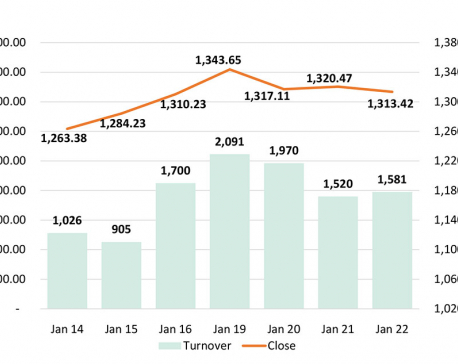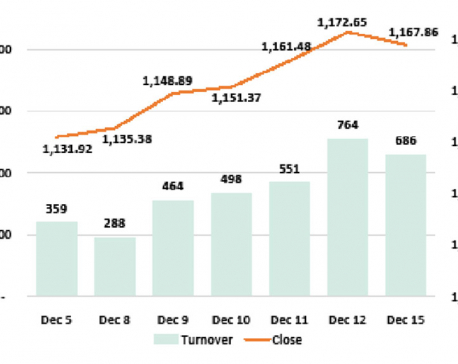
OR
Sitting and former finance ministers call for rescue of share market
Published On: December 12, 2018 09:58 AM NPT By: Republica | @RepublicaNepal
KATHMANDU, Dec 12: Sitting and former finance ministers are in agreement on the possible measures to rescue the current share market from plunging further.
Speaking at the parliament's Finance Committee Tuesday, they stressed on the need to boost the confidence of investors and take appropriate steps to reform the Nepal Stock Exchange (Nepse), the only stock market of the country.
The Nepse saw a 52-¬week low last week amid selling pressure which was further fuelled by the hike in the banks' interest rate on shares.
Addressing the committee on the situation of capital market, Finance Minister Yuba Raj Khatiwada said: "The government is cautious about the current share index. I want to appeal to the investors to be confident that their investments are secured. But they should try holding shares for a little longer."
Khatiwada's statement was a U-turn from his early opinions after assuming office in February. Investors and the opposition party have been blaming Khatiwada for affecting the share prices when the market was already seeing a downward trend.
Khatiwada also said that he was making efforts to address the concerns of the capital market, including withdrawal of the imposition of Value Added Tax on the transaction of stocks.
The minister spent most of his time underlining the importance of the capital market. "Investors should not always depend on margin lending or share-against-loan to purchase share. It would be better if they used personal saving for such investment,” Khatiwada said.
He also advised the committee to invite a team of independent experts, having no conflict of interest, to provide suggestions to the government for strengthening the share market.
Meanwhile, former Finance Minister Surendra Pandey said that the government should embrace policy measures to ease all types of loans including margin lending, while working to boost the confidence of the stock market.
"The central bank also should make liberal policy on margin call by changing the current 20 percent on the margin lending. It should also regulate the interest rates bargained by institutional depositors such as Employment Provident Fund, Citizens Investment Trust and other welfare funds," added Pandey, who is also a leader of the ruling Nepal Communist Party. These institutional depositors' bargaining has been the major factor driving the interest rates high, he argued.
Former Finance Minister Gyanendra Bahadur Karki, a leader of the opposition party, criticized the government for manipulating the share prices unnecessarily. He objected to the government actions, stating that it was putting the investors' money at stake.
Meanwhile, former Prime Minister Baburam Bhattarai, who was also the Finance Minister in the cabinet led by erstwhile Maoist leader Pushpa Kamal Dahal in 2008, said that fall in share prices has become a matter of concern for all. He suggested the government to work toward expanding and enhancing the stock market.
Bhattarai's statement also came as a U-turn from his previous statement of comparing the country's share market to a gambling den. His negative statement had led the share market to plunge to the lowest point of 292 in 2008. It took years for the market to recover.
Incumbent Finance Minister Khatiwada, who was the Governor of Nepal Rastra Bank (NRB) from 2010 to 2015, had introduced a regulation setting the ceiling of bank loans and investment on real estate and stock market, in a move to reduce the exposure of the banks and financial institutions to unproductive sectors.
The regulation is attributed as a major factor behind the stocks slump to the lowest on June 15, 2011.
Incumbent NRB Governor Chiranjibi Nepal stressed on the need for expanding the capital market and increasing its reach to the people in all rural municipalities to encourage them to invest for future.
"We want to expand the practice of share trading through our bank network across the country, as almost all local levels have banks these days. But only one bank has applied for working as a broker in those areas," added Nepal.
Representatives of investor associations, merchant bankers as well as representatives of Nepse and Securities Board of Nepal had also shared their opinions during the meeting. The committee will continue discussing on the matter further.
You May Like This

Nepse recoups previous day losses in relief rally
KATHMANDU: The benchmark Nepal Stock Exchange (Nepse) index began the day on a positive note shooting up by almost 40... Read More...

Nepse sees modest drop
KATHMANDU: Stocks dipped sharply in the initial trading hour on Wednesday. After a failed attempt to trade in green in... Read More...

Nepse snaps 8-day winning run, ends 5 points lower
KATHMANDU: Trading began on the Nepal Stock Exchange (Nepse) on a positive note on Sunday. The benchmark Nepse index got... Read More...




Just In
- CM Kandel requests Finance Minister Pun to put Karnali province in priority in upcoming budget
- Australia reduces TR visa age limit and duration as it implements stricter regulations for foreign students
- Govt aims to surpass Rs 10 trillion GDP mark in next five years
- Govt appoints 77 Liaison Officers for mountain climbing management for spring season
- EC decides to permit public vehicles to operate freely on day of by-election
- Fugitive arrested after 26 years
- Indian Potash Ltd secures contract to bring 30,000 tons of urea within 107 days
- CAN adds four players to squad for T20 series against West Indies 'A'














Leave A Comment